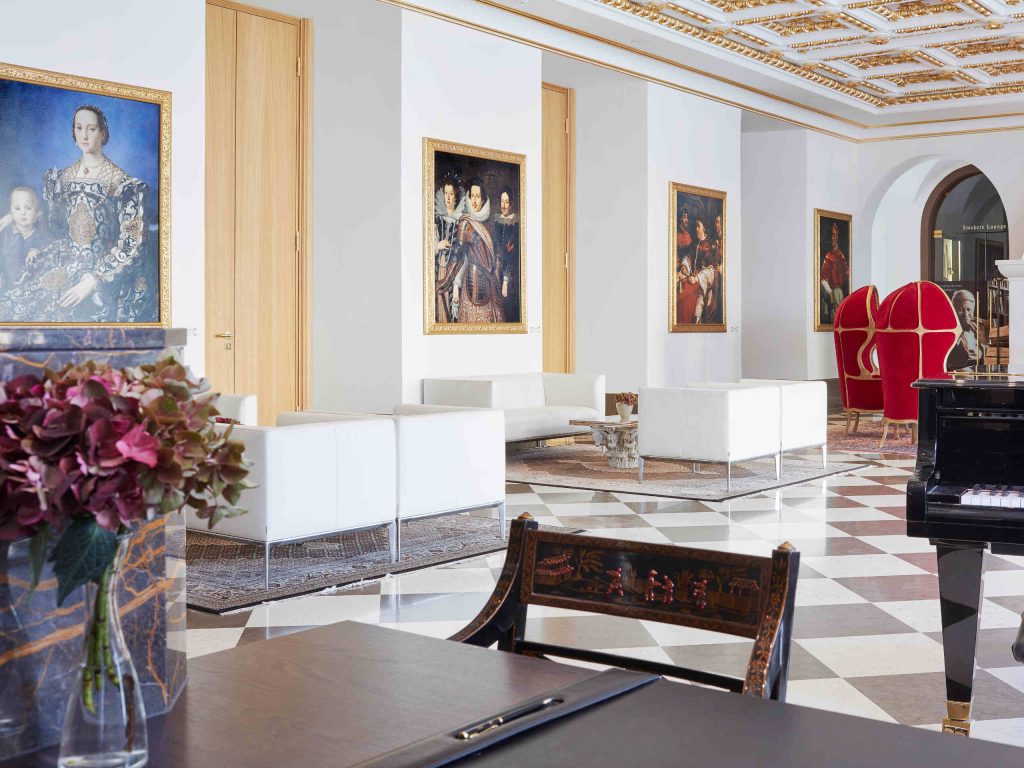
“For me, art is a way of approaching the world and things and topics that you have to deal with in your business environment.”
Max Schlereth, owner of Living Hotels
Surrounding yourself with beautiful things – numerous hotels and catering businesses have jumped on this bandwagon. Each with its own individual input and output, because art is certainly never the same. The Hirschen in Dornbirn, for example, exhibits the sculptures of self-taught artist Günter Nussbaumer, while the restaurant of the same name in Lambach makes room in the Herzogstube for openings by young up-and-coming artists from Upper Austria under the motto „Kinski & Kunst“. And the Malerwinkel in the Styrian Vulkanland region even describes itself as an art hotel, as “eat+art” artist Peter Troißinger is at home here.
Art and gastronomy or the hotel industry go together wonderfully, but for Max Schlereth, owner of Living Hotels, not just as decoration: “For me, art is a way of approaching the world and things and topics that you have to deal with in your business environment.” Two approaches are essential for him here: on the one hand, a clear, sharp, analytical view of things, and on the other, an intuitive, pre-reflective, pre-minded approach. Both together make up the whole and “then the immeasurable complexity of a person meets a framework in the service”. And further: “This results in authenticity, which in turn is expressed through the stage, in our case the hotels, and this is where art and the hotel industry come together.”
Elsewhere, in Salzburg, whose history lies in the hands of culture anyway, a similar approach is being taken: Schloss Leopoldskron recently hosted a cultural reception under the motto “New Splendor in the Red Salon”, to which Mozarteum University, Salzburg Global Seminar and the hotel were equally invited. Musical performances and recitations formed a symbiosis that once again turned the Salzburg event location into a cultural venue. “For me, culture is a part of society and what makes society what it is,” emphasized Schlereth, who also holds the position of Society President.
He was always surrounded by art, it accompanied him throughout his life. This is one reason why art objects can be found in the lobbies, public areas and rooms of the Living Hotels. In the De Medici House in Düsseldorf, part of his father's considerable art collection has even been exhibited, “so that art can be experienced in a very informal and indirect way”. This makes the De Medici the first art museum in this country where you can also sleep, says Schlereth and knows the nickname of the house: “Little Louvre on the Rhine”.
But how can art and gastronomy/hospitality be found in practice, apart from the obvious? Through the employees, as Schlereth explains: “An organic connection is created by removing the ritualized, the rigid and creating space for development - not in such a way that everyone is allowed to do everything, but that the hotel is seen as a stage on which the employees act as if in a play.” However, this should not be planned; mistakes should also be allowed to happen sometimes. This can result in unexpected encounters and events that have the potential to touch people - both the employees themselves and the guests. “So instead of turning a hotel purely into a gallery, I like the approach of creating many small works of art from the mutual experience on the hotel stage itself,” he concludes.

When the new France edition of the Michelin Guide is presented on March 16, 2026, the international gourmet scene will turn its attention to Monaco for the first time. The Principality will host the official ceremony – a first in the history of the restaurant guide. The venue will be the Grimaldi Forum Monaco, organized as part of a joint initiative between the Principality of Monaco and Monte-Carlo Société des Bains de Mer, which is acting as the exclusive partner.
It is more than a cookbook. Kanaan – Cooking without borders is a manifesto for understanding, compassion, and what good food has always been able to do: bring people together. Every day at the Kanaan restaurant in Berlin, Israeli Oz Ben David and Palestinian Jalil Dabit demonstrate that cuisine speaks a universal language – and that where there is cooking, understanding begins.
INFO
Kanaan – Cooking Without Borders
Authors: Oz Ben David, Jalil Dabit
Photography: Elissavet Patrikiou
Publisher: Südwest Verlag
Length: 192 pages
ISBN: 978-3-517-10429-4
Price: €28.00 (Germany) / €28.80 (Austria) / CHF 38.50
Las Vegas is known for its long nights, which makes places that do mornings really well all the more important. Between the Strip and downtown, there are a surprising number of spots where breakfast and coffee are not just an afterthought, but are deliberately celebrated. It’s these places that make all the difference: quiet, high-quality, and offering just the right amount of enjoyment before the day gets going.


Surrounding yourself with beautiful things – numerous hotels and catering businesses have jumped on this bandwagon. Each with its own individual input and output, because art is certainly never the same. The Hirschen in Dornbirn, for example, exhibits the sculptures of self-taught artist Günter Nussbaumer, while the restaurant of the same name in Lambach makes room in the Herzogstube for openings by young up-and-coming artists from Upper Austria under the motto „Kinski & Kunst“. And the Malerwinkel in the Styrian Vulkanland region even describes itself as an art hotel, as “eat+art” artist Peter Troißinger is at home here.